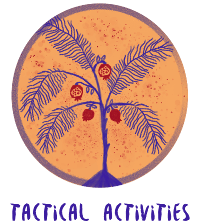Recognising your power
Developed for APC by Serene Lim and Angela M. Kuga Thas of KRYSS Network
About this learning activity
This learning activity is the suggested tactical activity for “Sexuality and internet governance”. This activity is designed to encourage participants to revisit existing strategies and to think of new strategies to advance sexuality rights in internet governance.
Learning objectives
- To identify where participants’ power lies in relation to their activities over the internet in order to be better able to strategise and advocate for sexuality rights in internet governance.
Who is this activity for?
Participants of all levels of experience.
Time required
1.5 hours
Resources needed
- Flip chart paper
- Marker pens
Mechanics
Get participants to work in groups to think about why they remain engaged online and the difficulty of negotiating online spaces.
What is the added value of remaining online? Ask them to be specific (which spaces, why, what purposes, etc.) and to think along the terms of networking or connections, information/news, quality of interaction and building on relationships, ability to create content and distribute content, herstory/memory, having access to new contacts/networks, etc.
With the knowledge of what keeps us online and what empowers/disempowers us, get the participants to think of strategies – either improving existing strategies or thinking of new ones – to advance sexuality rights in internet governance
To encourage participants that sexuality rights can be taken up in internet governance spaces, share the following information:
- APC’s Take Back the Tech! campaign was able to build upon the visibility of sexuality rights to broaden the reach of work on digital safety and security for women and girls, gaining mainstream coverage from CNN, the Washington Post, Time magazine and Reuters, among others.
- The EROTICS research was able to provide a deeper spectrum to the analysis and strategising around the campaign for changing the reporting policies of Facebook, Twitter, and YouTube by bringing LGBT experiences into the discourse of online violence, thus making inter‐movement linkages and connections.
Facilitator’s preparation notes
To try to help participants think outside the box, suggest the following:
- Feminist digital labour (or work) in mobilising, calling out, content creating and criticising sexism, misogyny and patriarchy remains predominantly unwaged and emotionally draining and is often received with violence. How can we ensure the sustainability of the movement?
- How can we rethink empowerment and responsibility when we operate on the very technologies (e.g. Facebook, Twitter, Google Docs, Gmail) that functionally surveil us and are used to obstruct our rights?
- What does free and autonomous consent look like on the internet? What aspects of our privacy and personal data are we surrendering in exchange for access to resources – and how are they gendered and sexualised? An example of this would be how many women are sharing/commercialising their private life, i.e. their relationship with family, in exchange for viewership and advertising income. Or how a woman remains on Facebook for professional networking purposes, but in exchange, Facebook has access to the woman’s personal data, and because Facebook knows she is a woman, they push certain advertisements to her.
- What if there is no privacy and privacy is illegal? [This question is just meant to play devil’s advocate and to provoke deeper thinking, especially in relation to the double standards that we so often witness.] Could that help advance sexuality rights in internet governance? Would it help us have a different perception of nudity and sexualised content? If there is no privacy, will it be easier to know if someone is being sexually coerced and exploited? Will it mean the non-existence of anonymity, and how will this help or worsen advocacy?
- Is there a bystander syndrome over the internet that we need to eradicate or reduce in terms of its impact? Why are online harassment, surveillance and policing of sexuality tolerated by online communities? How do we encourage more active/wider engagement online and how will that relate to internet governance?
- What does people power look like over the internet? Was the closest example the uprising in Egypt (2011)? How would such people power affect internet governance?
Encourage participants to think from the desired outcomes and what’s needed to get there. Attempt different approaches so that participants are better able to think differently about strategies.
Become familiar with the following APC initiatives
Feminist Principles of the Internet
https://en.ftx.apc.org/books/ftx-safety-reboot-english/chapter/feminist-principles-of-the-internet
Take Back the Tech! campaign
https://www.takebackthetech.net/
EROTICS research
https://erotics.apc.org/
Sexual Rights and the Internet Training Kit
http://gigx.events.apc.org/2015/06/23/sexual-rights-the-internet-training-kit/.

